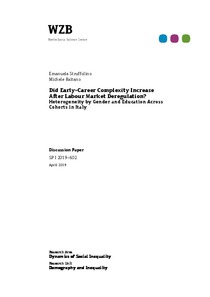Did early-career complexity increase after labour market deregulation? Heterogeneity by gender and education across cohorts in Italy
"This article considers the complexity of early employment life-courses focusing on the heterogeneity by gender and education. We construct 7-year-long early employment trajectories by using a unique longitudinal dataset that combines administrative records on employment episodes and survey dat...
| Main Authors: | , |
|---|---|
| Institution: | ETUI-European Trade Union Institute |
| Format: | TEXT |
| Language: | English |
| Published: |
Berlin
2019
WZB |
| Subjects: | |
| Online Access: | https://www.labourline.org/KENTIKA-19308135124911263179-Did-early-career-complexity-in.htm |
| Summary: | "This article considers the complexity of early employment life-courses focusing on the heterogeneity by gender and education. We construct 7-year-long early employment trajectories by using a unique longitudinal dataset that combines administrative records on employment episodes and survey data from the Italian module of the EU-SILC. This enables the application of advanced methods in sequence analysis to calculate the complexity of employment trajectories following labour market entry. Complexity reflects the instability of early-careers by considering the number of transitions between employment states and the length of each episode. We compare several cohorts of Italian workers who entered the labour market between 1974 and 2001 in institutional contexts characterized by different levels of deregulation. The results demonstrate that earlycareer complexity increased across cohorts, but mostly for medium and lower-educated individuals. This dynamic is particularly pronounced for women, and complexity is the highest for recent cohorts, especially among those with less human capital." |
|---|---|
| Physical Description: | 23 p. Digital |

